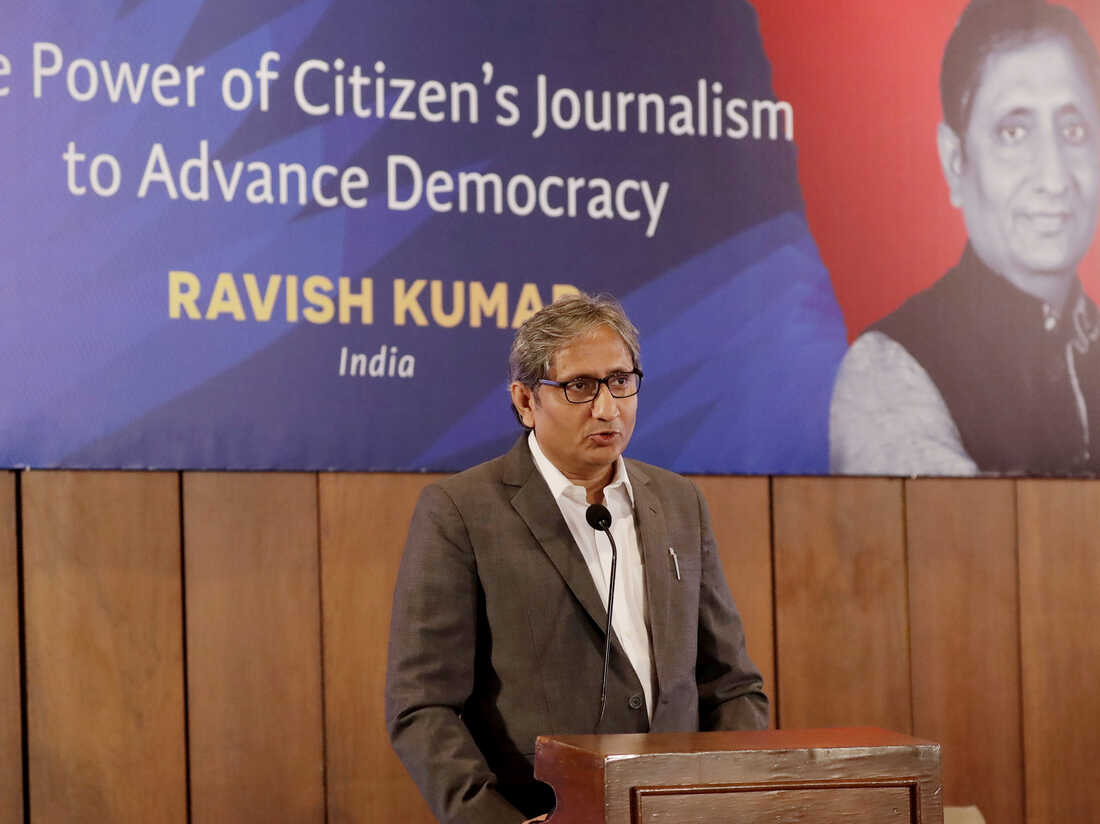NEW DELHI — “I have resigned,” the journalist declared in a YouTube video last November. “You won’t hear me on NDTV anymore saying, ‘Hello, I’m Ravish Kumar.'” And with that, the longtime face of New Delhi Television, one of India’s oldest news broadcasting channels, stepped down.
Ravish, 48, had been with NDTV for 26 years. At the time of his resignation, he was senior executive editor at the news outlet, known for its fierce and critical coverage of government policies and citizens’ voices.
But since last August, when Gautam Adani, a controversial magnate, announced his move to acquire the channel in a hostile takeover, anxiety in the newsroom grew — as did the departures of network leaders like Ravish.

Indian journalist Ravish Kumar delivers a lecture on Sept. 6, 2019, in Manila, Philippines. Kumar, one of India’s best-known TV figures, resigned from the NDTV channel after a business magnate with close ties to Prime Minister Narendra Modi, whose government has chipped away at press freedoms, announced his move to acquire the channel.
Adani, who is closely associated with Prime Minister Narendra Modi, is the founder of the Ahmedabad-based Adani Group, India’s largest port operator and largest coal trader. After a recent report by Hindenburg Research accused Adani Group companies of decades of stock manipulation and accounting fraud, the prime minister has tried to distance himself from the tycoon’s controversies. (Adani has denied wrongdoing).
Adani has said that NDTV would remain independent under his ownership and would call out the government when it has “done something wrong.”
But his critics are not convinced.
“Much of Adani’s wealth has been a direct result of this problematic relationship [with the prime minister]. … So, it’s only expected that an Adani-owned channel would work to keep up the Modi-Adani ties,” says Somdeep Sen, a political scientist at Roskilde University in Denmark.

Members of opposition Congress party, demanding an investigation into allegations of fraud and stock manipulation by India’s Adani Group, display a placard with images of Indian businessman Gautam Adani and Indian Prime Minister Narendra Modi during a protest in New Delhi, Feb.6.
Press freedoms are among other rights being squeezed in India
Conglomerates’ takeovers of media outlets are not unique to India. But New Delhi-based historian Mukul Kesavan, who is also an independent journalist, says Indian media takeovers by Modi government allies are “symptomatic of a larger malaise” posing threats to rights.
“It would be a mistake to look at the takeover of NDTV as a thing in itself. I think it’s part of a much larger battering down on basic, fundamental, democratic rights — the right to organize, the right to protest, the right to march, the right to speak and the right to publish,” says Kesavan.
According to Amnesty International, Indian authorities are increasingly imposing unlawful and politically motivated restrictions on freedom of expression and assembly. (Amnesty International was itself targeted by Modi’s government, and was forced to shut its India operations in 2020).
Source: NPR









